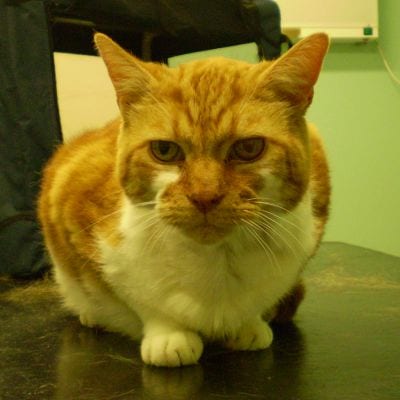Pet of the Month – ‘DJ’
DJ is an eleven and a half year old cat who definitely earns the right to being named June’s ‘Pet of the Month’, having spent a couple of weeks in the ward at Estcourt Vets! Initially he was a bit wary of us, but by the end of his stay he was loving a fuss and had the loudest purr on the ward!
DJ suffered from a condition which is very common in older cats called hyperthyroidism (an over active thyroid), caused by tumours of the thyroid glands found in the neck. Owners of cats with hyperthyroidism usually notice their cat’s developing a voracious appetite and thirst but they stay thin as a rake despite all the eating! But occasionally people are unaware there is a problem because they are happy that their elderly cat is eating so well and seems so full of energy (when actually they are unusually hyperactive for their age!)
Most of the time hyperthyroidism in cats is easily managed with medication, but in DJ’s case the dose of medication needed constant adjustment so close monitoring was essential. Fortunately there are other ways of managing the condition and after some deliberation the owners decided to opt for an operation to remove the effected thyroid glands, despite the risks of potential complications. DJ’s thyroid gland tumours were the largest that the vet had seen in the last fifteen years! Poor DJ, it is no joke to say it must have been like having a couple of golf balls in his neck! This posed a problem at surgery because engulfed in this abnormal tissue were tiny ‘parathyroid’ glands that the vet had to carefully identify and preserve. Although these parathyroid glands are small they are essential for controlling calcium levels in the body and their blood supply is easily affected during complicated thyroid surgery. After surgery DJ was sent back to the ward to recover and the following day he was bright enough to go home, regular post operative check ups were arranged. Over the next 48hrs however DJ stopped eating and became lethargic and noticeably twitchy. Fortunately DJ’s owner had been primed to look out for these signs of low blood calcium and rushed him into the practice where he was immediately hospitalised. An intravenous drip was placed and he was given calcium into the vein to help correct his blood calcium levels. DJ stayed in special care with us, receiving extra care and cuddles from the nurses as well as medication designed to support his parathyroid glands and slowly he improved. He is back home now and doing really well, he is off his calcium supplements and is currently only on vitamin D support which will also be weaned off over the next couple of weeks. It has been a longer road to recovery than normal for DJ, but he is looking forward to a thyroid-free future with no medication required!
< Back to articles Estcourt Vets Devizes
Estcourt Vets Devizes